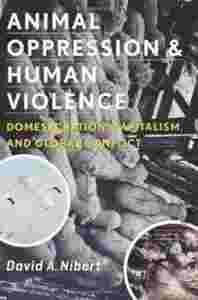|
Jared Diamond and other leading scholars have
argued that the domestication of animals for food,
labor, and tools of war has advanced the development of
human society. But by comparing practices of animal
exploitation for food and resources in different
societies over time, David A. Nibert reaches a
strikingly different conclusion. He finds in the
domestication of animals, which he renames
"domesecration," a perversion of human ethics, the
development of large-scale acts of violence, disastrous
patterns of destruction, and growth-curbing epidemics of
infectious disease. Nibert centers his study on nomadic
pastoralism and the development of commercial ranching,
a practice that has been largely controlled by elite
groups and expanded with the rise of capitalism.
Beginning with the pastoral societies of the Eurasian
steppe and continuing through to the exportation of
Western, meat-centered eating habits throughout today's
world, Nibert connects the domesecration of animals to
violence, invasion, extermination, displacement,
enslavement, repression, pandemic chronic disease, and
hunger. In his view, conquest and subjugation were the
results of the need to appropriate land and water to
maintain large groups of animals, and the gross amassing
of military power has its roots in the economic benefits
of the exploitation, exchange, and sale of animals.
Deadly zoonotic diseases, Nibert shows, have accompanied
violent developments throughout history, laying waste to
whole cities, societies, and civilizations. His most
powerful insight situates the domesecration of animals
as a precondition for the oppression of human
populations, particularly indigenous peoples, an
injustice impossible to rectify while the material
interests of the elite are inextricably linked to the
exploitation of animals. Nibert links domesecration to
some of the most critical issues facing the world today,
including the depletion of fresh water, topsoil, and oil
reserves; global warming; and world hunger, and he
reviews the U.S. government's military response to the
inevitable crises of an overheated, hungry,
resource-depleted world. Most animal-advocacy campaigns
reinforce current oppressive practices, Nibert argues.
Instead, he suggests reforms that challenge the
legitimacy of both domesecration and capitalism.
|
|

